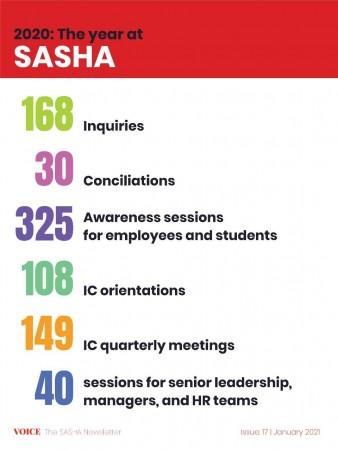A senior project manager with more than 15 years of experience in the IT industry recently put down her foot and decided to put an end to her miserable work life during the pandemic. After three months of trying to trudge the tricky path of committing to client projects, filling up for quitting team members and unreasonable work hours, she resigned from her services. "If you google, attrition rate of so and so company in India, you will have the figures," says Madhu (name changed on request) about her IT company that has seen many of its resources calling it quits in the last few months.
"The sad part is that positions cannot be filled at the same rate that attrition takes place and hence, those who stay back have to double up their duties, work insane shifts without proper training. I was nearing a breakdown," adds Madhu who handled a team of more than 50 employees at her workplace.
What can be defined as harassment at the workplace?
Workplace harassment can be defined as circumstances that create a hostile work environment making the victim feel unsafe and uncomfortable. Harassment at work can fall under several categories including verbal, psychological or physical, however, cases of sexual harassment are taken most seriously. The Sexual Harassment of Women at Workplace (Prevention, Prohibition and Redressal) Act, 2013 also known as POSH has a huge role to play in this. However, it may not be the case in all types of workplaces.

POSH, too posh for public sector
Rekha Shukla of Kaveri NGO in New Delhi has been working as an external member of the sexual harassment complaint committee and a counselor for the 'Me Too' movement since 2014. She feels that while corporates and private organizations take POSH very seriously, in the public sector, the scenario is very different.
"My main area of work happens with public sector banks. While the pandemic affected most workplaces and made employees home-bound to pursue work, many from the banking sector didn't have this privilege. Last six months, I came across three cases of harassment, however, by mid-year, all complaints were dropped due to delay in action," she shares adding that during this period of waiting, a transfer in job or apology by the accused makes the victim revoke the official complaint.
"All offices are supposed to display their Internal Committee member names and contact details on the notice board. In case of any harassment faced, the employee should be able to report it directly to the committee. However, not all offices do this. Out of lack of information, some victims reach out to the National Commission of Women directly with their complaints. In one case, a complaint was sent to NCW in May 2020 and the organization concerned received that from NCW only in March 2021," further states Rekha Shukla on instances of delay in action.

Digital Violation during WFH is the new normal
In comparison to the pre-pandemic era, the filing of sexual harassment complaints has gone down noticeably. "Cases of inappropriate staring and touching have gone down but the work-from-home culture has also altered the way in which misconduct takes place. We receive more than ten cases of digital violation every month," shares Kanti Joshi, founder of SASHA (Support against sexual harassment), a Bangalore-based NGO that extends support to more than 200 private organizations pan-India in terms of investigating the offense as an external member of the committee.
According to SASHA, while in the 'work from office' scenario, sexual harassment took place through face-to-face interactions, once work moved to home spaces, such practices too moved to digital mediums like Watsapp, commonly used now for day-to-day communication.
Some of the complaints of digital violation include sending obscene or pornographic video messages to female colleagues, passing sexually coloured jokes or remarks, forcing female colleagues to switch on video during calls, lewd comments on display pictures/attire. Very few cases were reported involving other social platforms such as Facebook. The accused in such cases were either permanent employees, contractual employees or even interviewees.

In 2020, SASHA handled 168 inquiries of sexual harassment, out of which, 30 resulted in some sort of conciliation.
During WFH, identifying harassment is tricky
Post the outbreak of Coronavirus in India, most private companies resolved to work from home culture beginning March 2020.
Rhoma Bhatia of Spherule, a support organization for workplace harassment feels that with the adoption of the work-from-home model due to the pandemic, people have lost basic common sense of healthy work ethos.
"The number of official complaints during work from home has come down certainly but that may also be because there is a very thin line between what can be passed as okay and what needs to be reported as inappropriate," he says.
A senior HR employee with a leading private organization points out that women have been subjected to inappropriate remarks during virtual meetings.
"Sometimes female colleagues do not wish to switch on the video option during calls, which is understandable, but later have to face remarks which hit below the belly. For instance, maybe so and so hasn't done her makeup and that's why doesn't want to come on the video call. Once a mother of two small children had to face humiliation on the team call for her kids came in front of the camera and she had to manage them during the call," he shares adding several cases of such nature have been reported to the HR grievance cell and action has been initiated.
Fear of being judged, still a deterrent
It is mandatory for organizations with 10 or above resources to be POSH compliant and channel appropriate training, workshops and awareness programs to ensure their staff feels secured and safe at the workplace. While the legality aspect does act as a preventive measure to some extent, often the victims step back for the fear of being out and about with the matter and judged by bosses or other senior officials.
"In my experience, I have noticed several cases where the victim either hopes for some kind of conciliation or tolerates till he/she can and then find a way out of the company instead of going through the hassle," adds Rhoma Bhatia who has received only two official complaints in the last six months and knows of several cases where victim chose to accept an apology issued by the accused and close the matter even before bringing to the Internal Committee.















